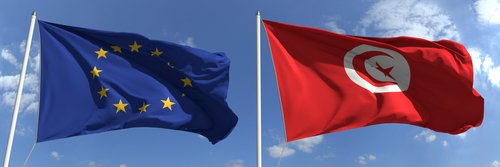Belgium (Brussels Morning Newspaper) Tunisia possesses both the necessary ingredients and the capacity to invigorate its economy to become a “Mediterranean tiger.” Yet, this potential has remained largely untapped since the dawn of its 2011 uprising. One of the key reasons is the political class’ willful ignorance and internal conflicts, which have become increasingly intolerable to ordinary Tunisians.
Tunisia, once the lodestar of democracy in the Arab world, has descended into rampant authoritarianism, economic shortsightedness, and an inability to rein in its informal economy. These factors have eroded the country’s foundations and, today, Tunisia seems incapable of resurfacing without international intervention.
However, President Saïed, who dissolved parliament, and proceeded to rule by decree, has dismissed international assistance, rebuffing “foreign diktats” to appeal to Tunisian nationalist feelings.
He rejected the stipulations set forth by the IMF, which entail among others, restructuring around 100 state-owned enterprises and eliminating state subsidies on basic commodities. By choosing this path, he is staking the country’s future, particularly that of the poor.
Tunisia’s national debt is growing close to 100% of GDP. To balance its 2023 budget, the country needs to secure just over € 7 billion, € 5 billion of which could only come from external sources. Keeping this in mind, the President of the EU Commission, Ursula von der Leyen, has offered to support Tunisia with over €1bn of aid in return for better border control and measures against human smuggling.
This renewed EU partnership is supposed to provide Saïed a lifeline to rescue the country from the self-destructive cycle it is caught in. However, the signing of the memorandum of understanding on 16 July 2023, largely inspired by the Italian “Mattei Plan”, will hardly help Tunisia. The so-called “Process of Rome” led by the Italian far-right is a copy of another agreement signed by Italy with Libya aiming at containing migrants, militarily.
In reality, Tunisia’s socio-economic situation is so precarious that it risks flaring up at the slightest misstep. Hence, Tunisia’s dilemma when faced with Italian prime minister Georgia Meloni’s tempting proposal to become the EU’s coastguard under European remuneration.
Just a few weeks after the Italian-led EU offer of a deal on migration, Tunisia deported hundreds of sub-Saharan migrants across the border into the hot Libyan desert. Reports and direct testimonies allude to instances of physical abuse, forced deportations, exploitation, systemic discrimination, and denial of essential services like food, water, and healthcare. This rise in racially motivated violence had begun after Saied’s speech last February in which he spoke of the “hordes of irregular migrants from sub-Saharan Africa” who come bringing “violence, crime, and unacceptable practices”.
It’s evident that a short-term Meloni fix does not serve Tunisia’s best interests. Instead, the country requires a comprehensive, long-term agreement with the European Union, one that encapsulates issues of both legal and illegal migration, mobility, education, and skills.
I believe the need of the hour is to preserve Tunisia’s manufacturing base and halt the brain drain. We need investment in innovative entrepreneurship and new financing models.
The current circumstances for Tunisian companies are fragile. Sales are concentrated in a small local market, where purchasing power is shrinking by the day; opportunities for development and internationalization are limited by existing legal, administrative, and financial barriers. And all of this is happening in the absence of public policies that could help emerge from the crisis in the short to medium term. To mitigate this vulnerability and prevent a complete economic collapse, it is crucial for Tunisian companies to pursue international diversification in the near term.
Conversely, it is necessary to broaden the range of financing and support mechanisms for innovative entrepreneurship in manufacturing, which is globally recognized as a strategic sector. On one hand, it generates local prosperity through the development of technology and intellectual property, while on the other, it draws both local and international talent, effectively countering the brain drain that has escalated to nearly pandemic proportions in Tunisia.
These companies, primarily SMEs and innovators, find themselves trapped between three perpetually expanding forces. Firstly, there is the State and its administration, unable to implement reforms and sustain their lifestyle chiefly through skyrocketing tax pressure and domestic financing. This situation depletes market liquidity, stifles investment, and even hampers the financing of projects. Secondly, the cash economy dominates the country’s principal sectors and, by allying with those in power, impedes any transformation that would challenge the status quo that favors it. Lastly, the shadow economy, capitalizing on the import restrictions enforced by the State to hoard foreign currency, is seeing its domain broaden generating ever more extensive corruption circuits involving the population, businesses, and local administrations.
As we witness the descent of a once hopeful budding democracy into authoritarian rule, Tunisian decision-makers appear to be trapped in a quicksand of paralysis. The president appears inept at cultivating favorable conditions to jumpstart the economy. His efforts are confined to minor and populist undertakings with limited impact, attempting to obscure this state of affairs with diversions. The latest is his inflammatory and discriminatory discourse against sub-Saharan migrants. Such populist policies will not help Tunisia rise from its economic abyss. Nor will EU-Meloni’s latest deal offer a sustainable and long-term recovery.
The policies of the US and EU towards Tunisia must chart a fresh course, working collaboratively to design a novel toolkit for democracy and economic development. This will help safeguard freedoms in Tunisia and ensure their sustainability.
Opinions expressed in the op-ed section are solely those of the individual author and do not represent the official stance of our newspaper. We believe in providing a platform for a wide range of voices and perspectives, even those that may challenge or differ from our own. As always, we remain committed to providing our readers with high-quality, fair, and balanced journalism. Thank you for your continued support.Sincerely, The Brussels Morning Team




